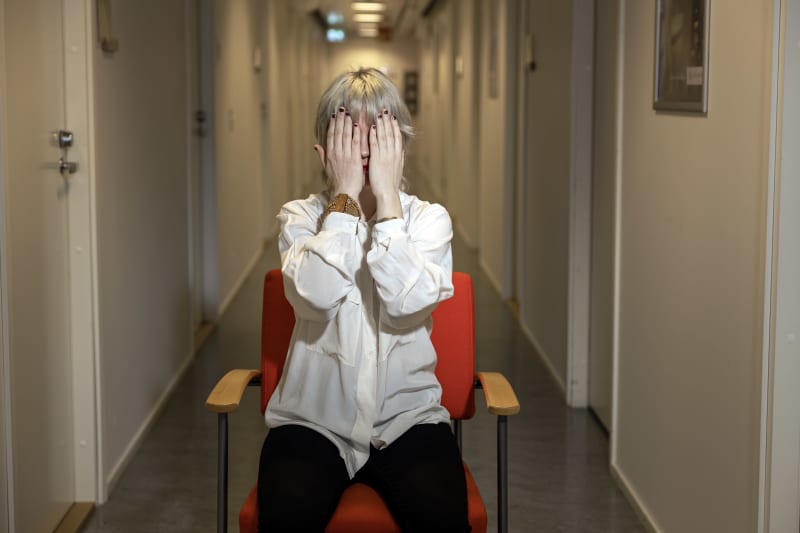
Cultural guest, writer, researcher Susanna Hast kept silent about her experience of sexual violence. Writing freed her from shame and guilt.
How to write about things you don’t remember? How to solve a crime with no witnesses?
The result was the first work *Rooms/rooms* (S
– I hadn’t really talked to anyone about it. I protected others by keeping quiet. At the same time I sacrificed myself.
Writing and publishing the book scared Hasti. What are people saying? From now on, is he just the type who has experienced sexual violence?
However, writing was liberating. After the publication of the book, the stress-related symptoms caused by the trauma have decreased almost completely.
– Writing the book was a good way to deal with the issue and try to influence the social debate. When I wrote, the power remained with me.
How is it possible that this happens?
Now six months have passed since the publication of the book, and Hast says that he is living the happiest time of his life. The fears of being stigmatized and the reactions of those close to us were unfounded.
– I feel that I am being listened to. My say seems to matter.
Although Hasti’s book is based on personal experience, it is above all social.
With the analyticalness of a researcher, Hast dismantles structures and views on power and violence that have been etched into our thinking. The book is an important speech, and it was awarded in November with the Helsingin Sanomat literary prize, which is awarded to the best first novel of the year.

Hast does not describe the violence he experienced in his book, nor in this story. Instead, he looks at emotions, guilt, shame and the mechanisms of society. The most important question is: How is it possible for this to happen?
According to the 2020 crime victim survey, half a percent of men have reported that they have been the target of sexual violence or attempted sexual violence. The differences in the numbers between men and women are clear.
It’s easy to look away
However, there is no reason to celebrate. Hasti’s book shows that there is still much room for improvement.
– Committing sexual violence is easy. Getting caught is rare. When this is the case, something is wrong with society.
This year, there were desired changes to the sexual legislation. The new law emphasizes sexual self-determination and consent.
– In my own youth in the 1990s, I felt that as a girl it was difficult to recognize one’s will, let alone show it.

However, there has been a change. You have to
However, we don’t want to talk about more serious sexual violence yet. It’s too terrible.
– People feel really troubled when talking about sexual violence. That’s one reason I haven’t talked about my experiences. I didn’t want to be a prankster.
Hast emphasizes that no one is forced to talk about their experiences. Those who have experienced violence do not need to tell their experiences with their own faces in order for society to change.
– No one needs to sacrifice again.
Another reason for the silence is that sexual harassment and violence are more common than we want to believe.
– They don’t want to admit how common it is, and how gendered it is. It’s much easier to just look away.
The shame and guilt felt by the victim sit firmly in the structures of society. Even before the beginning of our era, Hammurabi’s law made rape a punishable act. However, then the father or spouse of the raped person received compensation. The victim was often killed along with the perpetrator.
There has been progress since those times, but slowly.
– There is something rotten in society if the victim still has to feel guilty. He is guilty until he can prove his innocence.
Violence became the norm
In her book, Susanna Hast describes the sexual violence she experienced as a case report. He tries to trace what happened, how he got into violent situations, what was wrong with him. Memories are very dangerous, because the human mind tends to forget the worst things.

Situations and feelings rushed to Hasti’s mind as pictures of different rooms. He remembered the color of the door frame, the coldness of the tile and the shape of the chair leg. Rooms are also metaphors for the body.
– I have long periods in my youth that I don’t remember anything about.
Hast remembers the feeling of worthlessness. He felt that his body did not matter. That’s why he was bold at times. He was also angry. Not at all to the guilty, the boys, but to himself.
– Later I realized that my behavior was caused by trauma. When a young person experiences sexual violence, something is destroyed.
In the case of Hasti, the violence repeated.
– I got used to violence. It became normal.
Hast was 12 years old when he first experienced sexual violence.
Is the victim’s story true?
Had alcohol been consumed? What were the clothes like, not too provocative I guess? Anyway, was it so terrible?
Sexual violence is still associated with questioning the victim’s story.
– The victim is often the only witness. Therefore, the victim may begin to doubt what he experienced.
In his book, Hast also highlights the victims of television crime series. They are almost always women and usually dead.
– I became interested in how much more energy society would put into finding out what I experienced if I had died. For those who are alive, the only option left is to continue their life crushed.

However, Hast found a way to survive. In high school and university, he gave his all to his studies. Only the best grades were eligible. The master’s papers were not enough, he defended his doctorate in international relations.
– By studying and succeeding, I was able to prove my decency. To cover my dirt.
Violence has crept into Hasti’s academic research as well. Among other things, he has studied the war in Chechnya from the perspective of compassion. Currently, he is involved in the Kone foundation’s project, which studies militaristic language. The research coincided with the current world situation.
– Society is now under the spell of military power and there is an understandable need for it. The use of military language has increased enormously.
Hast himself has noticed that nowadays he knows a surprising amount about weapons and military strategies that he had never heard of before.
There is also a problem with bellicose language.
– It is reactionary in terms of equality. Military language inevitably emphasizes military masculinity.
The trauma remains
It is difficult to talk about sexual violence experienced as a child or teenager. Hast also remained silent for decades. He quietly suffered from workaholism, memory problems and a sense of absence. He thought they were \”character defects\”.
Through the writing process, he realized that the experiences are not normal, but coping mechanisms resulting from trauma. Only then did he go to therapy.

With the completion of the book and horse-assisted psychotherapy, Hast feels that he is doing well. In addition to the research project, there is also a novel in the works. It is currently personal, but the genre may still change.
Even though things are fine now, the trauma will always be a part of Susanna Hasti. He won’t forget anymore.
– I also don’t want to forget others who have had to experience sexual violence.
*What kind of thoughts did the article arouse? You can participate in the discussion until 23:00 on March 20.*
